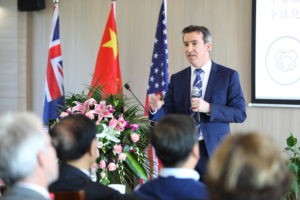
This is probably going to sound arrogant and presumptuous, but the notion that people describe themselves as a ‘Speaker’ has really been annoying me. So many profiles where people seem to think that listing themselves as a speaker is some kind of descriptor for talent. Whether it’s keynotes, presentations, or attaching yourself to some well-known brand of speaking engagement (such as TED), standing up in front of people and talking at them from a stage doesn’t qualify as having the experience or expertise to think that ‘speaker’ captures value or impact.
So yes, I’ve given plenty of talks, keynotes, and presentations over the years. Some I think went really well, and some that certainly fell flat. I’ve never used the phrase ‘speaker’ to describe what I do. When I see this being used by so many people, my first reaction is “What are you a speaker of? How do you communicate your expertise?” This is often when the need to understand more about the person becomes nebulous. There seems to be a pattern for those that use this speaker descriptor, who have given the same talk multiple times. In education events this is a very common thing. I followed a twitter conversation the other day where educators were remarking on an unnamed consultant educator who gave the same talk over multiple years, down to the same jokes. I understand why people want to keep using the same engaging content as a product, but I think it shows a lack of empathy and care for the audience and why they’re sitting there – especially when someone realises they’ve heard all this before.
When I curated Do Lectures Australia over 2014-15, many of the speakers had never spent much time presenting a talk under 20 minutes. Certainly there was some polish to those that knew how to articulate and gesticulate to engage the audience, but some of the most memorable and powerful talks were by those who had strong expertise and a great story to tell. I was prompted to give my own Do talk in 2015. I played with the idea of giving my talk in chapters and messages, but I’m not very happy with how this final talk came together. I think it was uncomfortable for me share more personal stories, but at least I tried to use some different approaches.
Using different content and approaches has been a constant driver in my speaking engagements. I’ve often said that I have never given the same talk twice, and I love the challenge this brings. It means that I have played with many different techniques and configurations, and I always think about the audience experience. The photo at the top was taken in November last year in China, when I presented to a room of Chinese and some foreign education leaders and professionals. My talk was about ‘Reimagining partnerships’ and I used the analogy of the ocean and ‘partner-ships’ as a way to communicate how schools could navigate and negotiate their links with the world. It worked well, with Chinese educators mirroring back to me afterwards their keenness to get aboard the ‘partner-ship’. I’d also grabbed the nearest roving mic and stepped out from the behind the lectern to give the talk, to break some subtle expectations.
TED has a lot to answer for in people attaching themselves to this as a sign of being a good speaker. TEDx has created even more ways people identify their expertise as ‘TEDx Speaker’. Sure there’s a lot to be proud of in giving a TED Talk, but it’s your expertise and storytelling that makes it watchable. Why not describe yourself as ‘education provocateur’, ‘AI-tech speaker’, or ‘feminist presenter’ or whatever best captures your driver? Being a speaker is not enough. Unless of course you’re involved in Toastmasters, or big debating competitions; but then you’d say that.
It’s really hard curating people to come and speak to audiences on relevant, provocative, and impactful topics. Sure it helps when people have experience speaking to audiences, but that shouldn’t be the first criteria – otherwise you get types like the ‘tech-commentators’ who’ve collected some slides they Googled, and come up with a cool way to share it. Anyone is capable of giving an amazing talk – it’s harnessing their talents in ways that communicate to a large audience. Just don’t then make a career change in being a ‘speaker’.
